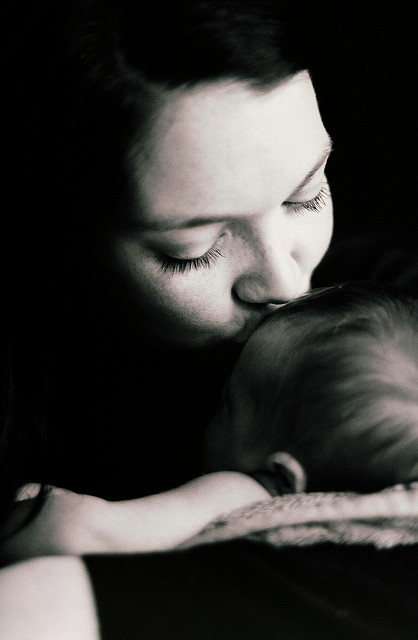
by Elizabeth Mandel
The Challenges of Raising Jewish Daughters
 Raised in a Modern Orthodox home, I have long struggled with the contradictions I have found inherent in being both a committed Jew and a feminist. I have managed to carve my own path, create my own rationalizations, and find a space that makes sense to me at the juncture of my religious practice and my political and personal commitment to gender equity.
Raised in a Modern Orthodox home, I have long struggled with the contradictions I have found inherent in being both a committed Jew and a feminist. I have managed to carve my own path, create my own rationalizations, and find a space that makes sense to me at the juncture of my religious practice and my political and personal commitment to gender equity.
I am the mother of three girls, G, aged 5, P, 3, and M, two months old. Parenthood changes and challenges so many things, not the least of which is self-identity. It also requires one to articulate and form a cogent explanation for one’s choices, choices that previously required no justification. Becoming the mother of three girls has brought into high relief for me the challenges of living a life dedicated to both Judaism and feminism, and forced me to reflect closely on my priorities.
When G was born, I was frankly relieved that there would be no bris and that therefore I would not to have to throw a party eight days post-partum. Yet I was also unprepared for the strong sense of exclusion I felt at the lack of a religiously mandated ritual welcoming my precious, perfect first child into the community. What did this say about her value and worth to the community I expected her to cherish as much as I did, and which, I in turn, expected to cherish her?
My husband and I carefully designed a simchat bat (a baby naming ceremony, literally translated as “joy of the daughter”) to welcome G, incorporating ritual with personal expression. We held it in our synagogue, we included the rabbi, and it felt spiritually fulfilling. Yet, I could not escape the fact that it was voluntary, not mandatory, and that it was not something she shared with all other affiliated Jewish females the way a bris binds all affiliated Jewish males together. And indeed, when our second daughter was born, we neglected to hold the same ceremony for her. I justified this by telling myself that it was because I suffered a serious injury just prior to delivery and I was not fully mobile for several months afterwards; but the truth is, we would have held a bris no matter what the circumstances. There is something about a ritual being obligatory that makes it…obligatory.
We have not, as yet, held a simchat bat for our newest daughter. I have a slew of excuses at hand (she was a summer baby, everyone was away; how could I make one for my eldest and youngest, but not my middle?), but I know these are just excuses, and that the real reason is that with three young children, I am barely keeping my head above water, and I am happy not to be obligated. At the same time, I feel I am betraying the realization of the feminist Judaism I wish for, as well as the daughters for whom I am trying to model religion and community. Even if I can live with this, how will I explain this to my girls when they are old enough to ask what we did to welcome them?
Earlier this month I attended the upsherin for the son of close friends (an upsherin is a ceremonial first haircutting of a boy after he turns three, marking the age of commencement of Torah study and formal education). It was beautiful and meaningful, and I once again felt a sense of exclusion that this lifecycle event exists only for boys (although unlike the bris, it is not obligatory). I felt this keenly as the upsherin is connected to education in general and the study of the Jewish text that defines us in particular.
My husband and I toyed with the idea of holding an upsherin for P, to make up for not giving her a simchat bat, but we both feel uncomfortable co-opting a male ritual for our daughter. Even this thought, which once would have been just a thought, I now feel the need to parse closely and arrive at a well-considered conclusion. For my choices and beliefs now extend far past my own needs, to the growth of my daughters into both committed Jews and committed feminists.
This blog will be dedicated to the challenges of raising Jewish daughters, from handling the male-dominated stories of our holidays and our texts, to setting priorities in choosing a synagogue and schools. What challenges have you faced? What solutions have you hit upon? Which choices are personal, and what responsibilities should be communal?
Image from Katie Tegtmeyer via photopin cc